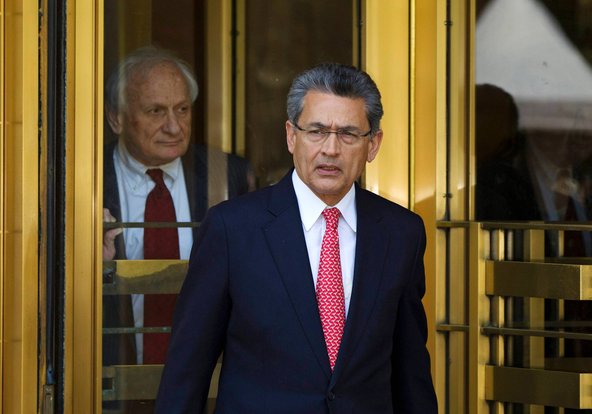 Lucas Jackson/ReutersFormer Goldman Sachs board member Rajat Gupta (R) leaves Manhattan Federal Court with his lawyer, Gary Naftalis, following a guilty verdict.
Lucas Jackson/ReutersFormer Goldman Sachs board member Rajat Gupta (R) leaves Manhattan Federal Court with his lawyer, Gary Naftalis, following a guilty verdict.
With the conviction of Rajat K. Gupta, the United States attorney in Manhattan, Preet Bharara, has now secured the biggest scalp yet in the government’s broad campaign against insider trading on Wall Street.
A victory in a case that relied almost entirely on circumstantial evidence is sure to embolden prosecutors in their pursuit of hedge fund traders and their tippers.
The government built its case against Mr. Gupta on evidence like the timing of phone and trading records, showing that incriminating wiretaps — like those used to powerful effect in the trial of Raj Rajaratnam, the hedge fund manager who received the tips from Mr. Gupta and who was convicted of insider trading last year — were not a requisite to convince a jury of guilt.
But after nearly five years of investigations and 60 convictions of hedge fund traders and corporate executives, a question looms for Mr. Bharara and his team of federal prosecutors:
Is it time to move on?
Several top prosecutors have done just that. Christopher L. Garcia, who helped lead the government’s widespread crackdown of insider trading, left in February. Jonathan R. Streeter, the lead prosecutor in the case against Mr. Rajaratnam, left earlier this year, as did Andrew Michaelson, who was crucial in bringing and prosecuting the Galleon case.
And the Gupta trial is expected to be the last for the prosecutor Reed Brodsky, who also prosecuted Mr. Rajaratnam.
Mr. Bharara himself appears to have shifted his focus — at least publicly — away from the prosecution of financial fraud. In recent months, cybercrime has become a top concern, with Mr. Bharara mentioning the subject with increasing frequency in articles and speeches, just as he had in past years with insider trading. Indeed, even as his office was busy trying Mr. Gupta, Mr. Bharara wrote an op-ed article in The New York Times, saying that he had “come to worry about few things as much as the gathering cyberthreat.” At a cybersecurity conference in January, he listed it as his top concern.
“Of all the issues I face as United States attorney — and there are many, many things that I have to deal with that are scary — cyberthreat in all of its breadth, variety and complexity is what worries me the most, the absolute most,” he told attendees.
So far, his office has brought just a handful of such cases, and not all have been home runs. In January, prosecutors charged two Russians with stealing personal and financial information from United States citizens through the use of computer programs. Last year, an appeals court vacated the conviction of a Goldman Sachs computer programmer accused of stealing trading programs from the investment bank.
It is unlikely, however, that insider trading investigations will grind to a halt anytime soon. Several cases remain outstanding, including the prosecution of Anthony Chiasson, a co-founder of the once-prominent hedge fund Level Global Investors. And examinations of other hedge funds continue, as the remnants and offshoots of the Rajaratnam investigation wend their way through the pipeline.
The Federal Bureau of Investigation has also indicated there could be much more to come, potentially placing those inquiries at odds with Mr. Bharara’s office. Top investigators at the bureau recently said the agency could pursue insider trading for the next five years. After spending years to crack the surface of Wall Street, authorities say they have a vast network of sources embedded among the inner circles of high finance that they can tap for new leads.
At the same time, the Securities and Exchange Commission continues to bring civil cases, no matter how small. The agency recently charged a paralegal and her father in Montana who made $67,000 trading off confidential information.
The crackdown on insider trading in recent years has drawn some criticism from those who question why big bank executives have not been charged over their actions in the financial crisis. While federal authorities have started investigations of the large banks, few have materialized into major criminal cases. Mr. Bharara, who became the United States attorney in Manhattan in 2009 after serving as chief counsel to Senator Charles E. Schumer, Democrat of New York, has bristled at such criticism, arguing that while the banks may have been irresponsible, that does not make their actions criminal.
Whatever his plans now, insider trading prosecutions have served Mr. Bharara well during his tenure. When he arrived at the office, prosecutors were already preparing charges against Mr. Rajaratnam, the result of a sprawling, multiyear investigation into one of the world’s most prominent hedge fund managers. Many of the charges brought by Mr. Bharara have been an outgrowth of that case.
The successful prosecutions have created a glow of media attention around Mr. Bharara, who follows a long line of prominent people in the office, including Rudolph W. Giuliani. A Time magazine cover in February featured a close-up of Mr. Bharara with the headline “This Man Is Busting Wall Street” superimposed on it. The cover ruffled feathers among colleagues at the United States attorney’s office and at the F.B.I., who felt Mr. Bharara was taking too much credit.
Many inside the office do not expect Mr. Bharara to remain in his current position much longer. Some suspect he will soon follow his colleagues to a corporate law firm, where he would very likely command a multimillion-dollar salary. And there is speculation that he could find himself on the short list of candidates to replace Eric H. Holder Jr., the United States attorney general, if President Obama is re-elected and Mr. Holder leaves.
Mr. Bharara, for his part, has said that he has the best job in the world and intends to keep it.
Article source: http://dealbook.nytimes.com/2012/06/15/victory-spurs-speculation-on-bhararas-next-move/?partner=rss&emc=rss